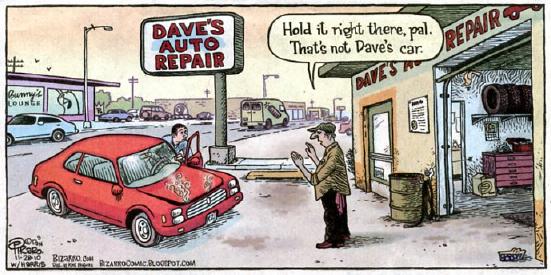  It takes the slightly twisted mind of Bizarro author Dan Piraro to contemplate the idea that "DAVE'S AUTO REPAIR" can be interpreted as meaning "A repair shop for fixing only Dave's auto", instead of as "An auto repair shop owned by Dave". Grammatically, "Dave's Auto Repair" is called a "noun phrase", and they can often be interpreted in more than one way, even though usually only one of the interpretations makes sense in context. Once you start thinking about these noun phrases, your mind starts to perceive the alternative interpretations. Is a "hot holiday sale" a sale being held on a "hot holiday" (in August, perhaps)? Can "quality car parts" only be used on a "quality car"? Can a "fresh pepperoni pizza" be a stale pizza made with fresh pepperoni? A three-word noun phrase can only be interpreted two ways, but as words are added, the number of interpretations increases. Allow me to back up a bit and define a "noun phrase". It's a collection of nouns and adjectives that can be treated in a sentence as if it were a single noun. What's interesting in Germanic languages like English is that in a noun phrase, nouns can be used as if they were adjectives, and the nouns and adjectives can be simply strung together without any connecting words. Consider "NATO", an acronym for the "North Atlantic Treaty Organization". While the words "north" and "Atlantic" are both adjectives, the word "treaty" is a noun. Nevertheless, it can be used in the noun phrase as if it were an adjective, and the four words can be just strung together. But what does it mean? Well, countries in the general vicinity of the "north Atlantic (ocean)" have agreed on a treaty, which they call the "North Atlantic Treaty", and there is an organization to deal with it. That group is thus called the "[[North Atlantic] Treaty] Organization", where I've grouped the words with brackets to show how they're connected. English speakers think this is all perfectly normal, but you can't do that in French. In French, the name NATO gets reversed, as is typically the case, so it comes out "OTAN". And "OTAN" stands for the "Organisation de la Traité de l'Atlantique du Nord". Including those small connecting words that I've put in bold, it translates to "Organization of the Treaty of the Atlantic of the North". "What a waste of space", I hear you (the English speaker) cry. Well, yes, the French takes up more space than the English, but it does grammatically make a distinction that the compact English phrase does not. Let's consider a different situation, in which there's a treaty covering the entire Atlantic ocean, both north and south, called simply the "Atlantic Treaty". Now suppose there were two organizations dealing with this treaty, a northern organization and a southern organization. Then the northern one would be called the "North [Atlantic Treaty] Organization", so without the brackets, it would still be exactly the same, "North Atlantic Treaty Organization", and it would still be abbreviated NATO. But not in French. Those little connecting words make all the difference. In French, this second case would be the "Organisation Nord de la Traité de l'Atlantique", and if you wanted to abbreviate it, it would come out "ONTA". Translated literally, it means the "North Organization of the Treaty of the Atlantic". So the French can grammatically make a clear distinction that English grammar cannot. There are some who believe it was this grammatical precision that made French the preferred language of diplomats. I think that was more likely the result of historical political factors. The abbreviation "O.E.M." is common in the business world, usually when speaking of an "O.E.M. contract", which is a contract to purchase some part or component in large quantities. Any engineer could tell you that the abbreviation "O.E.M." stands for "Original Equipment Manufacturer". But then ask that engineer what those words mean. He or she will usually stumble over this, and then guess that the designation refers to "the original manufacturer of the equipment". But that's incorrect. The actual parsing of the expression is "[Original Equipment] Manufacturer". An "Original Equipment Manufacturer" is a manufacturer of "Original Equipment" - that is, components that are included in a product when it is initially sold. Thus, an auto manufacturer will sign an "O.E.M. contract" for the purchase of a large number of tires to be included on his new cars - the "Original Equipment" tires. When these wear out, the car's owner will buy "replacement" tires in the "aftermarket". Note 1
For example, our local eatery "Mel's Commonwealth Café" has on its menu the item "Chicken Goat Cheese Salad". As soon as I saw it on the menu, I twisted the meaning into other than the intended "Chicken [Goat Cheese] Salad" - that is, a salad containing chicken and [goat cheese]. Instead, I thought of the offering as a "[[Chicken Goat] Cheese] Salad" - a salad containing cheese made from the milk of a "chicken goat", and I imagined one as shown to the left (courtesy of modern image-editing software). Note 2 Another Mel's offering? "Homemade Clam Chowder". Yes, for a good chowder, it's best to use homemade clams. Now that I've tipped you off to noun phrases, you can have as much fun with them as I do. Noun phrases, of course, are hardly the only source of amusing word play in English. If you want even more, I recommend that you read Dan Piraro's Bizarro comic. I follow it in The Boston Globe, where it appears only on Sundays, but click my next link for the Official Web Site for Bizarro, or my next link for Dan's Bizarro Blog. Enjoy!
  Note 1: Unlike tires, electronic components in devices don't usually wear out and need to be replaced (except for batteries). So when an engineer signs an O.E.M contract to buy, for instance, a large number of resistors (an electronic component), he or she doesn't think of them as "original equipment" in the sense in which car tires are "original equipment". Thus, "Original Equipment Manufacturer" is a noun phrase that many engineers misunderstand. [return to text] Note 2: I originally visualized the head of a goat on top of the body of a chicken. But then I thought, how can one milk a chicken to get the raw material for cheese? My wife Margie, an artist, has produced some paintings which are not scientifically or anatomically correct, such as a cow with five teats. But for this obsessive-compulsive engineer, even my bizarre fantasies need to be logically accurate. Margie's web pages, designed by my sister Alice, can be seen at http://MargretKrakauer.com/ (note the unusual spelling of her first name). [return to text]
 |
 Once you start reinterpreting noun phrases, you can find them all over.
Once you start reinterpreting noun phrases, you can find them all over.